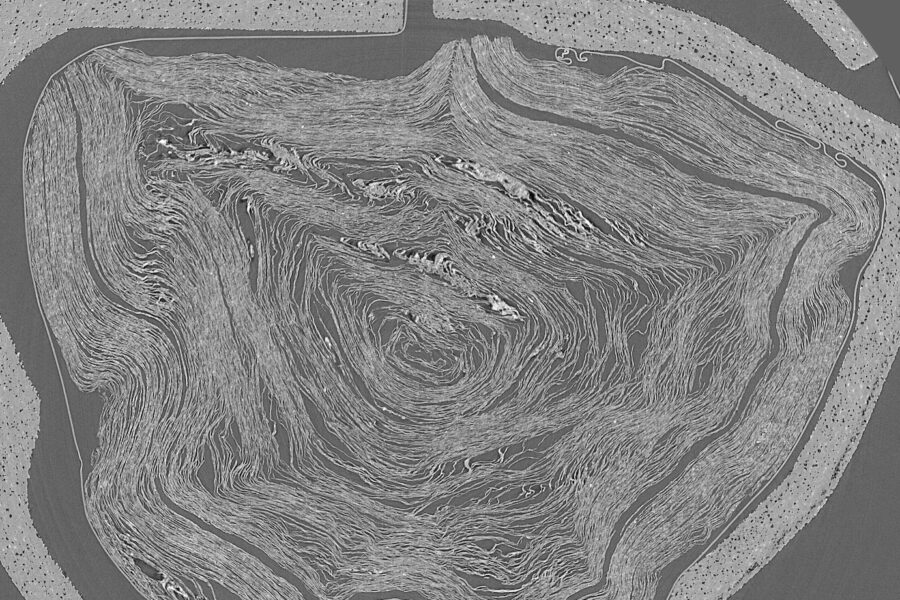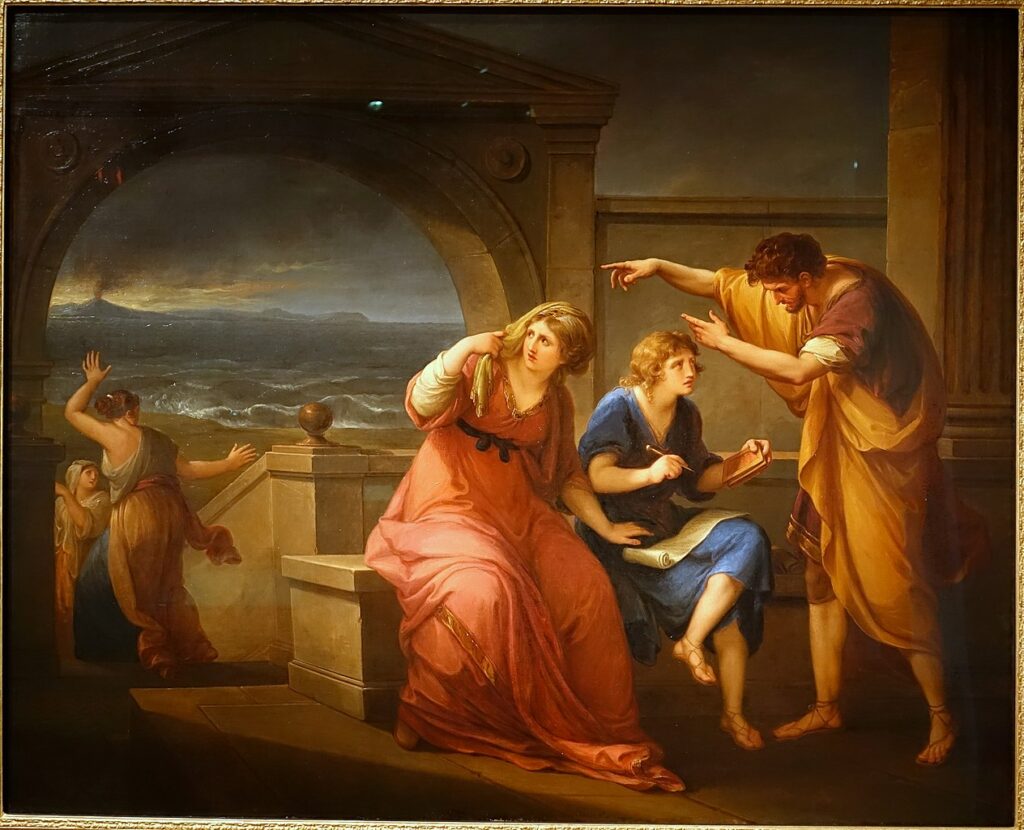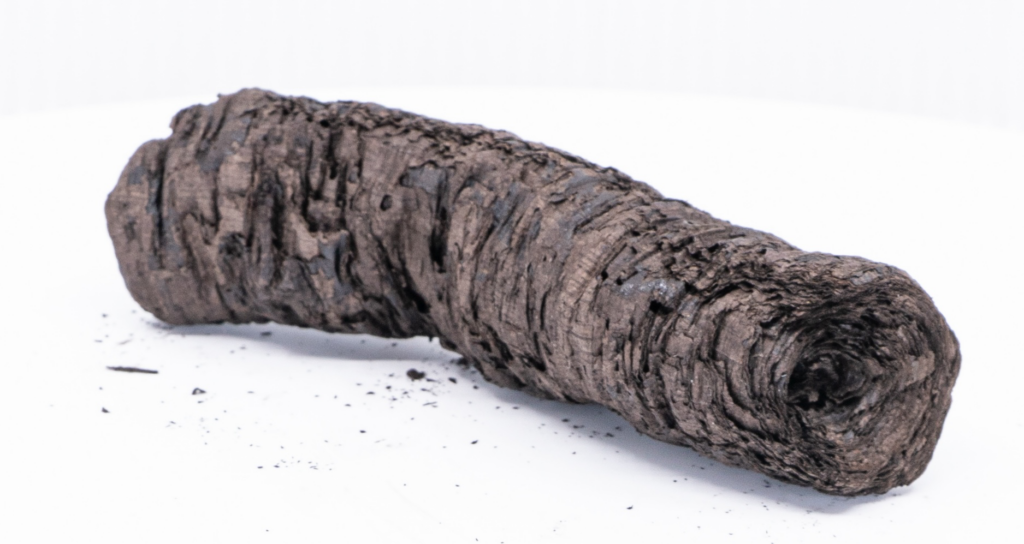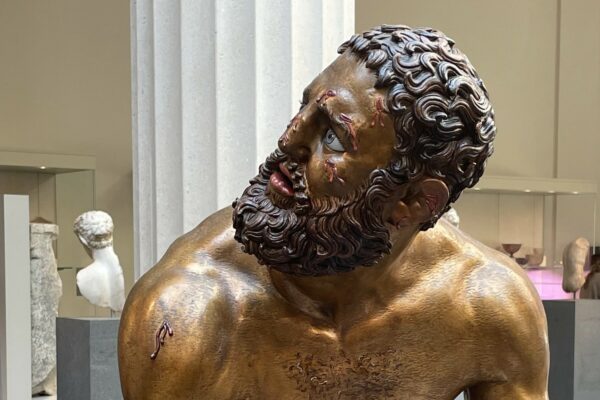
Believe it or not, multiple people saw something like this and thought “I should unroll that by hand. With a knife.”
Episode 74: In which the members of the Underworld Scientific Academy discover artificial intelligence, and (re?)visit a villa.
This episode of Real Housewives of Hades (a Mt. Olympus spin-off) brought to you by the latest archaeological news on SmithsonianMagazine.com – and by CLAS-C 361 Ancient Roman Revolutions.
[SETTING: Underworld Scientific Academy]
PLINY THE ELDER, ANCIENT SCIENTIFIC WRITER AND TERRIBLE VULCANOLOGIST: Good news, everyone! The mortals have located my villa outside Pompeii! And they’ve used artificial intelligence to read scrolls from a library at my friend’s nearby villa! Housing prices for the neighborhood are really going to go through the roof.
FRONTINUS, ANCIENT ENGINEER AND AQUEDUCT AUTHORITY: You know what literally went through the roof in your neighborhood? Flaming rocks and waves of incinerating gas.
VITRUVIUS, ANCIENT ENGINEER AND ARCHITECTURE AUTHORITY: Just ignore him. He’s just sore because no one is looking for his house.
FRONTINUS: Well, I’m sorry I didn’t have a nephew who wrote a heroic story about how I died trying to rescue the entire town of Pompeii single handedly. If no one survived, how did your nephew know what happened at your death? Answer me that.

As Vesuvius erupts, Pliny the Younger settles down to write some epic fan-fiction about his uncle. As one does.
VITRUVIUS: I’m confused, though. Why do the mortals need artificial intelligence to read the scrolls? Does no one speak Latin or Greek in the modern world? And what makes the intelligence artificial? Is this their way of saying they had enslaved scribes read the scrolls for them? Because in my day we elite men just called that “reading.”
PLINY THE ELDER: Oh no, there are a few remaining mortal scholars who speak the Greek of Aristotle and the Latin of Caesar. The mortals call these people “Classicists” and keep them in special people zoos called “Academia.”
FRONTINUS: So then why don’t the mortals just have these “Classicists” unroll the scrolls and read them?
PLINY THE ELDER: That’s the challenge, Old Chap—you can’t unroll the scrolls! Remember the eruption of Mt. Vesuvius that turned me into toast? Well, it did the same to the library at the Villa of the Papyri in Herculaneum: the super hot waves of noxious gas charred the papyrus scrolls like strips of crispy bacon. So when the artifact farmers found the scrolls millennia later and tried to unroll them, they would crumble into dust.
VITRUVIUS: The mortals would turn to dust? Are the scrolls magic?
FRONTINUS: No, the scrolls would crumble, you idiot. Although I’ll admit, it does sound like the mortals will need magic to read the scrolls.

Ancient philosophical treatise or overdone French pastry—you decide!
PLINY THE ELDER: From what I understand, the mortals recently used special light waves that shoot through the rolled scrolls and pick up traces of ink on the papyrus. They’ve actually been using that technique for years, but the results have been gibberish, because sorting through what ink traces make what letters at what overlapping parts of the scroll has been impossible. But they’ve just solved that problem by relying on an ancient Roman technique.
VITRUVIUS: Threatening to kill every tenth man until someone figures it out?
PLINY THE ELDER: No, turning the activity into a cut-throat competition and having a rich man offer fabulous wealth and glory to the winner. It really does work every time. It was just last year that they even launched this “Vesuvius Challenge.”
FRONTINUS: For gods’ sake, Pliny, get to the point! I hate having to get my news from the sort of person who paused fleeing a volcanic eruption so he could take a bath. How did the mortals unroll the scrolls?
PLINY THE ELDER: They didn’t! Three computer science students trained artificial intelligence to read ancient papyri, using something called databases that are available on lines of some sort. Then they had the intelligence read the data from the charred Herculaneum scrolls and make sense of it!
VITRUVIUS: What is computer science? Is that where you study the enslaved scribes who do your mathematical calculations for you? Why would that be an area of study? Are those scribes the “artificial intelligence?”
PLINY THE ELDER: Honestly, I’m not sure. None of the details made any sense to me. But the mortals did identify the word “porphyras,” and a bunch of musing about luxurious relaxing, and I certainly recognized that. As, apparently, did the super elites who funded the “Vesuvius Challenge.” It’s nice to see some things never change.

SEE?
VITRUVIUS: Maybe one of the scrolls is my treatise on architecture! If the mortals have the whole library, there must be thousands of scrolls to read.
PLINY THE ELDER: Actually, Old Chap, only a few dozens of scrolls survived the eruption. And the mortals of old destroyed a considerable number of the surviving scrolls in trying to read them.
FRONTINUS: Destroyed them? What were they doing with the scrolls?
PLINY THE ELDER: Cutting them open with knives, dipping them in mercury, trading them for kangaroos, anything they could think of, really.
VITRUVIUS: I take it back. I hope my treatise isn’t in there. But yours might be, Pliny! Or maybe just a scroll you owned and leant to the library’s owner. Didn’t you say they just found your villa at Misenum, the one your nephew describes in his letter to Tacitus?
FRONTINUS: Wait a second, are you trying to tell me that of all the villas in the entire Bay of Naples area, an area that has been built over by millions of people for thousands of years, the modern mortals just happened to find the villa owned by one of the most famous Roman authors, and described in one of the most famous passages in Roman literature? What is their evidence for this?
PLINY THE ELDER: (consults non-carbonized scroll) Well, now that you ask the question…according to the scholars Dr. Steven Ellis and Dr. Sarah Bond, there is little to no evidence whatsoever to connect the villa specifically to me. It is in Misenum, but then again, in our time the whole area was a vacation destination of the rich and famous, so finding a nice house there shouldn’t be all that surprising. (shrugs) I suppose it’s just the phenomenon whereby any archaeological finds sound so much more impressive if you connect it to someone historically important.
VITRUVIUS: No hope for finding your villa, then, Frontinus!
FRONTINUS: That’s not fair! Pliny here didn’t accomplish anything! He wrote a bunch of nonsense about rocks and then died by becoming the one idiot who actually sails towards an ongoing volcanic eruption! I wrote a masterpiece on hydraulic engineering and public water access, issues that still resonate today!
VITRUVIUS: Oh don’t worry, I’m sure the mortals have figured those problems out by now.
Share on Instagram, or really wherever you want.


